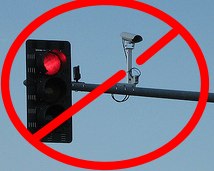 The Post Office Says What We All Wish We Could
The Post Office Says What We All Wish We Could
In a Jan. 22 letter sent to both the city of East Cleveland, Ohio, and the company that operates East Cleveland’s photo-enforcement program, Postal Service attorney Jennifer S. Breslin said the Post Office should ignore two school-zone speeding citations and five red-light infractions that postal trucks received in December.
“In providing mail service across the country, the Postal Service attempts to work within local and state laws and regulations, when feasible,” wrote Breslin. “However, as you are probably aware, the Postal Service enjoys federal immunity from state and local regulation.” She continued: “The state and/or local ordinances imposing penalties and fines cannot be enforced as against the Postal Service, and there is no statutory basis for doing so.”
Red-Light Cameras Bankrupt City
Like many cities around the country, San Bernardino, Calif., tried to make money via red-light cameras. But it didn’t turn out so well for this town.
In 2008, San Bernardino was caught cheating: To write more tickets, the city was using yellow lights that were timed too short for California law. When the city restored the proper yellow-light durations, the revenue from red-light violations sank—so much so that San Bernardino was losing money to ATS, the company it hired to operate the camera system. In 2011, the city council voted to end the contract before its 2014 term and pay ATS what it thought would be a $110,000 exit fee, but ATS claimed it was owed $1.9 million. In March 2012, the city added three more red-light cameras to try to make enough money to pay back ATS, even though by that time a San Bernardino county court had ruled that photo tickets were inadmissible hearsay. In August 2012 the city filed for bankruptcy, allowing it to finally end its contract with ATS.
Birthday Suit Protest
A court in Szczecinek, Poland on Dec. 11, 2012, imposed a 1000 zloty ($315) fine against a man who made an unusual protest against speed cameras. In October, Mariusz Sztuba hopped on his bicycle wearing nothing but sneakers on his feet and undergarments on his head. He raced past a speed camera in Bialy Bor at 33 mph. This being a 25 mph zone, the camera snapped a photograph.
Local police finally found Sztuba and charged him with violating the speed limit. Sztuba claimed he was protesting the automatic ticketing machine because it made his village known as a speed trap. The local judge still found him guilty.
Facing Your Digital Accuser
When Tacoma, Wash., motorist Kevin Schmadeka received a ticket accusing him of running a red light, courtesy of the Australian company Redflex that installed the system, he wanted to face his accuser and challenge the ticket. Just one problem: He was told he’d have to pay $670 in travel expenses to bring in a Redflex employee from out of state. “When I was at the clerk’s office inquiring about chain-of-custody information, the employee at the counter mentioned that if I wanted to subpoena a camera company representative that there was a fee,” Schmadeka told TheNewspaper.com. The judge singled out the Sixth Amendment right to face one’s accuser and dismissed the charges against Schmadeka.
When Driving and Parking Are the Same Thing
Like a lot of states, Missouri puts points on a person’s driver’s license if that person is convicted of a moving violation. But this rule created a problem for Kansas City, which wanted to rake in the bucks by handing out red-light camera tickets: It would have to prove who was driving the car, which is a lot harder than photographing a license plate and fining the owner.
So the city turned to some clever legal chicanery. According to a recent change in the city code, running a red light in Kansas City is now treated as if the owner of the vehicle parked illegally in the middle of an intersection. “The violation is not driving into the intersection but owning a vehicle that is found in the intersection while the light is emitting a steady red light,” a city memo said. The fact that this is a parking violation, not a moving violation, means that K.C. doesn’t have to bother with figuring out who was driving.
. . . . . . . . . . . .
This article was published in Popular Mechanics.